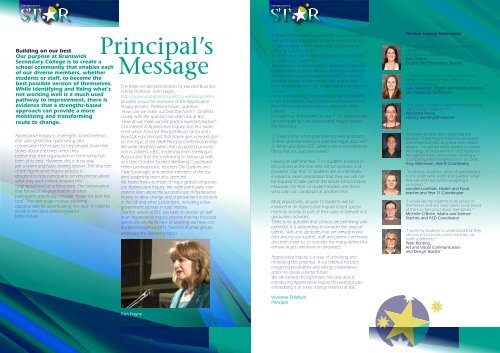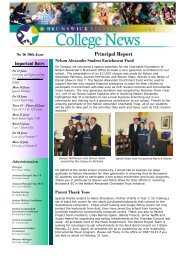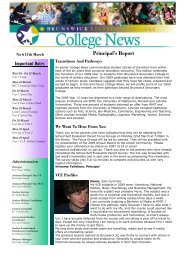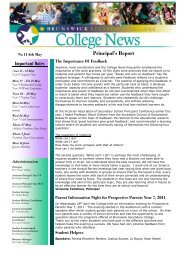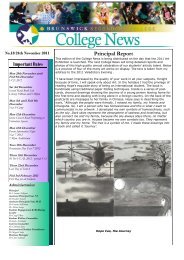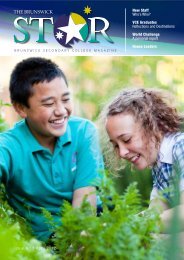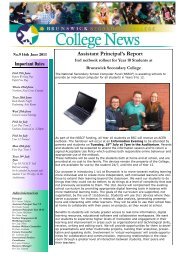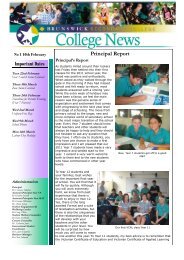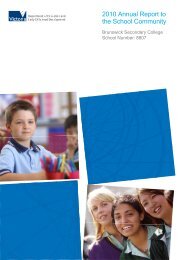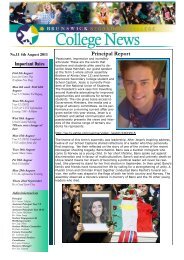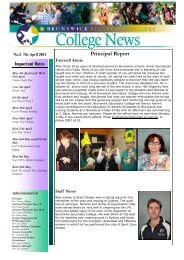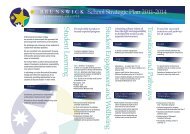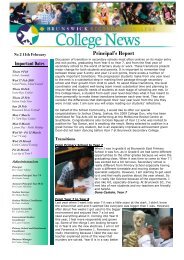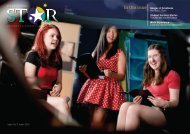In this Issue - Brunswick Secondary College
In this Issue - Brunswick Secondary College
In this Issue - Brunswick Secondary College
You also want an ePaper? Increase the reach of your titles
YUMPU automatically turns print PDFs into web optimized ePapers that Google loves.
THE BRUNSWICK<br />
THE BRUNSWICK<br />
Building on our best<br />
Our purpose at <strong>Brunswick</strong><br />
<strong>Secondary</strong> <strong>College</strong> is to create a<br />
school community that enables each<br />
of our diverse members, whether<br />
students or staff, to become the<br />
best possible version of themselves.<br />
While identifying and fixing what’s<br />
not working well is a much used<br />
pathway to improvement, there is<br />
evidence that a strengths-based<br />
approach can provide a more<br />
mobilising and transforming<br />
route to change.<br />
Appreciative <strong>In</strong>quiry is a strengths-based method<br />
that uses generative questioning and<br />
conversation techniques to help people share their<br />
stories about the times when they<br />
believe that their organisation or community has<br />
been at its best. However, <strong>this</strong> is in no way<br />
just a warm and fuzzy sharing session. The structure<br />
of the Appreciative <strong>In</strong>quiry process is<br />
designed to help participants be very precise about<br />
what they each believe enabled <strong>this</strong><br />
heightened level of achievement. The conversation<br />
that follows is an examination of what<br />
participants specifically consider ‘made the best the<br />
best’. The next stage involves exploring<br />
opportunities for accentuating ‘the best’ in order to<br />
envision and drive action toward a<br />
better future.<br />
Principal’s<br />
Message<br />
The three minute presentation by Harvard Business<br />
School Professor, John Hayes,<br />
http://www.youtubecomwatch?v=BqHeujLHPkw<br />
provides a succinct overview of the Appreciative<br />
<strong>In</strong>quiry process. Professor Hayes’ question,<br />
‘How can we make our best the norm?’ connects<br />
closely with the question we often ask at BSC,<br />
‘How do we make our best practice expected practice?’<br />
Our interest in Appreciative <strong>In</strong>quiry was first awakened<br />
when Assistant Principal Alison Sanza and I<br />
heard UK educationalist Trish Frayne give a presentation<br />
on the topic at the NMR Principal conference in May.<br />
We were delighted when Trish accepted our invitation<br />
to address a BSC leadership team meeting in<br />
August and that she is returning to follow up with<br />
us in late October. Student Wellbeing Coordinator<br />
Helen Lambropoulos, teachers Oki Gardner and<br />
Clare Kavanagh, and several members of the student<br />
leadership team also attended.<br />
We heard that a number of major global companies<br />
use Appreciative <strong>In</strong>quiry. We were particularly interested<br />
to learn about the successful use of Appreciative<br />
<strong>In</strong>quiry to drive change and improvement in schools<br />
in the UK and other jurisdictions, including a few<br />
government schools in rural Victoria.<br />
Our first action at BSC has been to involve all staff<br />
in an Appreciative <strong>In</strong>quiry process that has focussed<br />
specifically on the Review of Learning we have conducted<br />
throughout 2011.Teachers in small groups<br />
addressed the following topics.<br />
1/ Share a time when you felt that our community<br />
was at its best in relation to teaching and learning.<br />
2/ Tell us about a time when your teaching and<br />
learning was at its best.<br />
3/ At the end of the day, what legacy do you want<br />
to leave your students?<br />
The selection of teacher legacy statements quoted<br />
on here demonstrates the very strong commitment<br />
our teachers have to helping students be the best<br />
possible version of themselves, not only in their<br />
time as students here but in their adult lives beyond<br />
school.<br />
At its next meeting, School Council will participate<br />
in an Appreciative <strong>In</strong>quiry process and discuss how<br />
<strong>this</strong> method can potentially be used with other<br />
parents.<br />
<strong>In</strong> week four of <strong>this</strong> term, all Year 7- 11 students will<br />
be participating in an Appreciative <strong>In</strong>quiry around<br />
the following:<br />
1/ Share a time when your learning was at its best.<br />
2/ How did it feel when you were learning at your best?<br />
3/ When you leave BSC, what is the most important<br />
thing that you will have learnt?<br />
Having all staff and Year 7-11 students involved in<br />
<strong>this</strong> process at the one time will be symbolic and<br />
powerful. Our Year 12 students are so intensively<br />
involved in exam preparation that they we will not<br />
be required to take part in the whole school inquiry.<br />
However, the Year 12 student leaders and those<br />
who wish can contribute at another time.<br />
Most importantly, all year 12 students will be<br />
involved in an Appreciative <strong>In</strong>quiry based special<br />
memory activity as part of their suite of farewell and<br />
graduation activities.<br />
There is no question that schools are brimming with<br />
potential. It is astounding to consider the array of<br />
talents, skills and attributes that we already know<br />
exist among our student, staff and parent community<br />
and even more so, to consider the many others that<br />
remain as yet unknown or unrealised.<br />
Appreciative <strong>In</strong>quiry is a way of unlocking and<br />
mobilising <strong>this</strong> potential. It is a method for both<br />
imagining possibilities and taking collaborative<br />
action to create a better future.<br />
We are excited and optimistic not only about<br />
introducing Appreciative <strong>In</strong>quiry <strong>this</strong> year but also<br />
embedding it as a key change method at BSC.<br />
Vivienne Tellefson<br />
Principal<br />
Teacher Legacy Statements<br />
“Students question why, but then listen to the<br />
answers<br />
and grow accordingly!”<br />
Kate Allibon,<br />
English and Humanities Teacher<br />
“I want every student to feel valued as a<br />
person and have the skills to find and<br />
follow their passion.”<br />
Lara Alexander, English and History teacher,<br />
and Debating Coordinator<br />
“The ability to watch a documentary and ask:<br />
“Why should I believe <strong>this</strong>?”<br />
Alexandra Pierce,<br />
History and English teacher<br />
“For every student who I have had the<br />
privilege of teaching to have the emotional<br />
and intellectual skills to pursue their wildest<br />
dreams. I would like every student to spread<br />
the energy of empowerment and inspiration<br />
throughout their communities, creating a<br />
snowballing effect for generations to come.<br />
Tony Martinson, Year 8 Coordinator<br />
“To develop students’ sense of commitment<br />
to the wider wide world and question what<br />
they see and hear before accepting it<br />
as a given.”<br />
Lorraine Lockhart, Health and Food<br />
teacher and Year 11 Coordinator<br />
“I would like my students to be proud of<br />
themselves and not need others to be proud<br />
of them to feel good about themselves.”<br />
Michelle O’Brien, Maths and Science<br />
Teacher, and ASD Coordinator<br />
“I want my students to understand that they<br />
are connected to the world and they can<br />
make a difference.”<br />
Peter Runting,<br />
Art and Visual Communication<br />
and Design Teacher<br />
Trish Frayne


